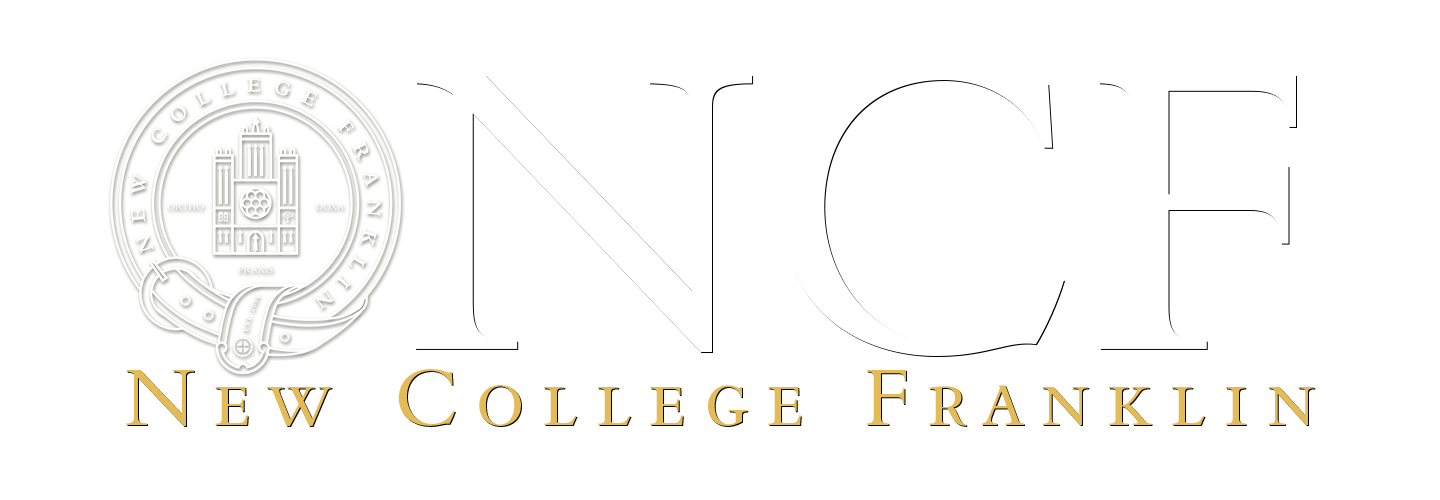
Trivium
The Trivium, the three little ways, refers to the first three disciplines of the seven classical liberal arts. Comprised of Grammar, Logic, and Rhetoric, these disciplines are in some sense more fundamental than the Quadrivium, insofar as these arts of language are manifested in all rational disciplines. The Trivium attends to the principles and practices of reasoning, communication, and charitable persuasion. Students study these fundamental arts of language and logic at a collegiate level, developing dialectical skill, grammatical facility, and the practice of giving truth its proper adornment—beauty of clarity and order. This entails attention to both the technical demands of the Trivium and its philosophic underpinnings.
Students study these three arts in preparation for the intellectual demands of the Quadrivium, but these arts are worthy in their own right. They train students in the habits of reasoning, writing, and communication which are ordered to truth, community, and charity. Traditionally, the Trivium along with the Quadrivium is a preparation for Philosophy and Theology.

-
Composition
This semester-long freshman course is one of the cornerstones of our program, introducing many of the skills required to thrive at the college and beyond, from reading, to discussion, to interpretation, analysis, and written communication. Composition uses only primary texts as source material for in-class conversations and written assignments. The goals of the course are to instruct students in every facet of the writing process: reading texts, understanding and interpreting texts, creating ideas that are analytical, interpretive, critical, and synthetic, organizing ideas, creating compelling research questions, forming thoughtful thesis statements, and mastering structure, textual support, style, mechanics, and grammar. Students will develop skill in the writing of essays, expository paragraphs, in crafting sentences, in the use and sense of diction, description and narration. They will also review the rules of punctuation and standardized formatting in Turabian style.
-
Logic
This course covers the fundamentals of logic with particular focus on the three acts of the mind (understanding, judgment, and reasoning) and explores the purpose and foundations of logic, terms and definition, logical fallacies, propositions and contradictions, arguments, and syllogisms.
-
Rhetoric
In this year-long course, students develop an appreciation for wisdom in its proper mode of presentation—beauty and clarity. Surveying both the classical and sacred categories of rhetoric, this course introduces students to the art of persuasion in speech and composition. Students learn and apply the disciplines of reading, writing, and oratory that serve as a foundation for effective communication, learning, and service.
-
Creative Writing
This year-long course examines the major genres of creative writing, including creative non-fiction, fiction, poetry, and songwriting, as well as the tools of the creative writer: point of view, characterization, setting, tone, style, imagery, structure, and thematization. Students practice developing their own skill in these elements. In addition, students will learn to analyze and compose prose and verse.
-
Poetics
In its essence, Poetics is applied knowledge and understanding--or wisdom. Wisdom crosses disciplines and makes connections between seemingly disparate subjects, such as rhetoric, mathematics, astronomy, music, architecture, theology, and philosophy. Poetics seeks to encourage poetic Biblical thinking that considers the beauty of presentation as part of the content. Poetic knowledge is not pragmatic, isolated, or manipulative, but rather beautiful in its application, true in its comprehensive nature, and good in its ethical character and purpose. Biblical wisdom and poetic knowledge imply a sensual, physical understanding that goes beyond mere mental assent.
